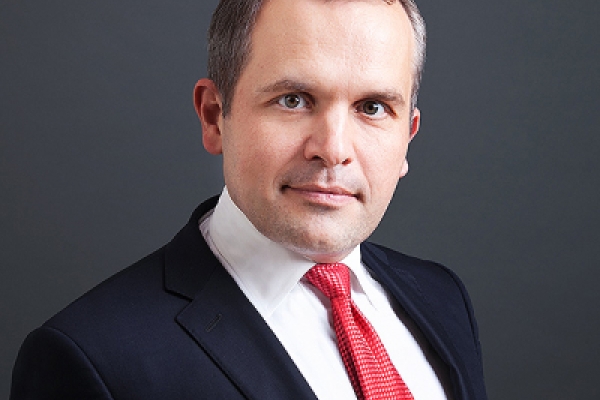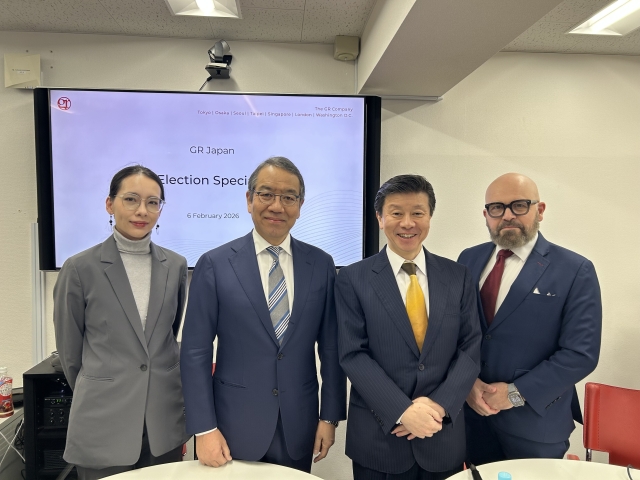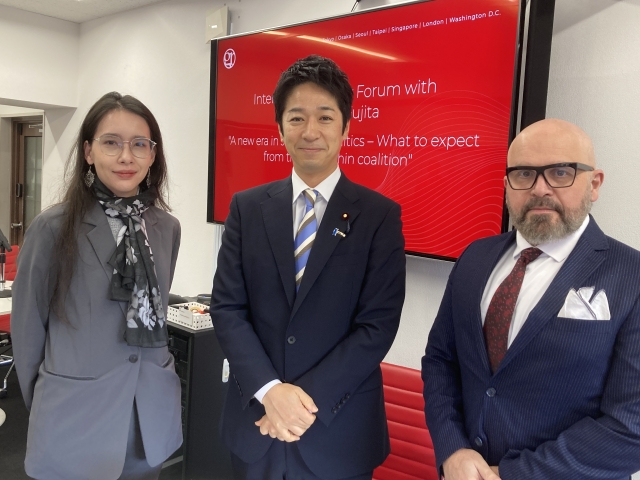An interview with GR Japan's Managing Director, Jakob Edberg, was featured in the October issue of the ACCJ Journal.
Read the brief version of the interview here or the full version below:
Engagement and influence in Japan's public policy
Interview with Jakob Edberg, Managing Director, GR Japan K.K.
Jakob Edberg co-founded GR Japan K.K. in 2010 and has since then helped lead the company to become Japan’s largest dedicated government relations and public affairs consultancy.
“GR Japan was born of the conviction that professional government relations approaches used elsewhere in the world, coupled with policy expertise and the right team of people, would be very effective in Japan. Government decision-makers here welcome input from expert players, including representatives from the private sector and foreigners with a global perspective. Yet there was a vacuum in the market – many businesses let precious opportunities to engage go to waste, or were simply unable to grasp them because of a lack of familiarity with Japan’s decision-making processes. From the beginning, one of GR Japan’s goals has been to close that gap, helping clients to put together workable plans, with clear goals, targets and timelines. Our goal has been to put together a world-class team of public policy professionals in Japan to deliver that vision, and to focus diligently on the provision high-quality government relations and public affairs in Japan.”
In September 2014, members of the GR Japan team presented a policy paper in Singapore on the changing policy landscape under Prime Minister Shinzo Abe. Edberg asserts that Abenomics has changed the playing field in Japan in a major way.
Q: Why did you launch this policy briefing now?
A: This is an important moment in Japanese politics and policy-making, with the new Abe Cabinet in place, and a crucial Extraordinary Diet Session about to begin. Abenomics began with radical changes to Japan’s monetary and fiscal policy. But the upcoming Diet session will see a large number of structural reforms proposals up for deliberation. This presents a real opportunity for foreign firms, whether they are operating here already, or considering Japan for the first time. We have already seen many companies taking a new look at Japan and expanding their activities here because of the political momentum and policy changes associated with Abenomics.
Q: How does the Cabinet reshuffle figure into near and long-term planning?
A: The overhaul of the Abe Cabinet is a telltale indicator of the government’s policy priorities in the year ahead. The previous Cabinet, was unchanged since December 2012, and was the longest serving Cabinet in Japan’s post-war history. That stability lent itself to predictability, which was welcomed by the market. But on the flip side, many Diet members in the Liberal Democratic Party (LDP) felt excluded from positions they might have received under the traditional system of rapid turnover in top positions. Abe was faced with the choice of appeasing the LDP or continuing to choose the advisers he wanted. But he also needed to boost his approval rates – public support being one of the key sources of his power. Having campaigned for increased female participation in the workforce, he knew also that he would be judged on whether his actions matched his words in that regard.
Abe’s choices reflected those necessities. On the one hand, he prioritized continuity, leaving almost all of the top office-holders unchanged – the key new appointments being Yuko Obuchi as Minister for Economy, Trade and Industry, and Yasuhisa Shiozaki as Minister for Health, Labour and Welfare. The media has noted the common ideological leanings of incoming Cabinet members, but it was significant too that he reached out to centrist factions through the appointment of Sadakazu Tanigaki as secretary-general of the LDP.
Looking further ahead, Abe’s term as president of the LDP will come to an end in September next year. Twelve months used to be about the length of a prime minister’s career in Japan, but the indications are that Prime Minister Abe would like to continue beyond then – if he can. That is why he has sought to hobble his strongest challenger for party leadership with a Cabinet post – the job of new minister for regional revitalization going to Shigeru Ishiba.
Q: What is significant about the recently revised regulatory reforms?
A: The package of reforms presented this year is certainly much more appealing than any we have seen before, and there is a sense that the leadership genuinely supports change. The drive to streamline and lower corporate taxation is critical. The current Japanese tax system is full of special measures for special interests. The pace of reform has been slow, and it has been a long time coming, but understanding the direction of the currents underlying the discussion is vital.
Q: In which industries do you foresee the most change under the growth strategy and new policy agenda?
A: Japan’s energy policy is in the spotlight. The Abe administration has been in limbo due to uncertainty surrounding the restart of nuclear reactors. Until we know how many reactors will be restarted and how soon they will go online, decisions on Japan’s energy future will be racked with uncertainty. The future of policy towards LNG and coal are wrapped up in this too, as are the fate of Japan’s electric power companies. That ties in also with the ongoing process of electricity market reform, another vital subject which will be up for discussion in this Diet session.
The medical sector has also been identified as an engine of growth – as a source of homegrown innovation, a beacon for international investment and a source of export growth. Almost unnoticed, the Japanese pharmaceuticals and medical devices markets have been undergoing major regulatory reforms in recent years, but there are increasing tensions between fiscal constraints and the clear need to reward and incentivize innovation. The government has started revising the pricing system to get products to market more quickly, but the Ministry of Finance is pushing back against what other countries might view as investment in the sector and in the economy. In terms of healthcare policy, I believe there will be a move toward prevention and early treatment, but we need to recognize that there will be an upfront cost to this.
There are a host of other bills awaiting scrutiny during the upcoming session. Which bills are enacted and which run out of time will be a question of political maneuvering. The outcome is not set in stone but will depend on conversations that have yet to take place.




